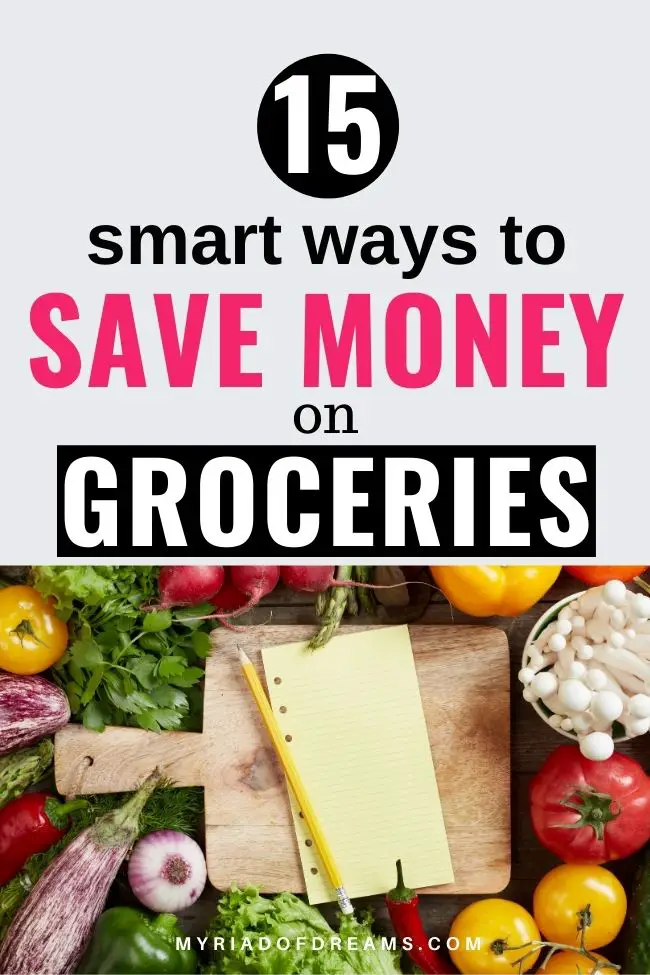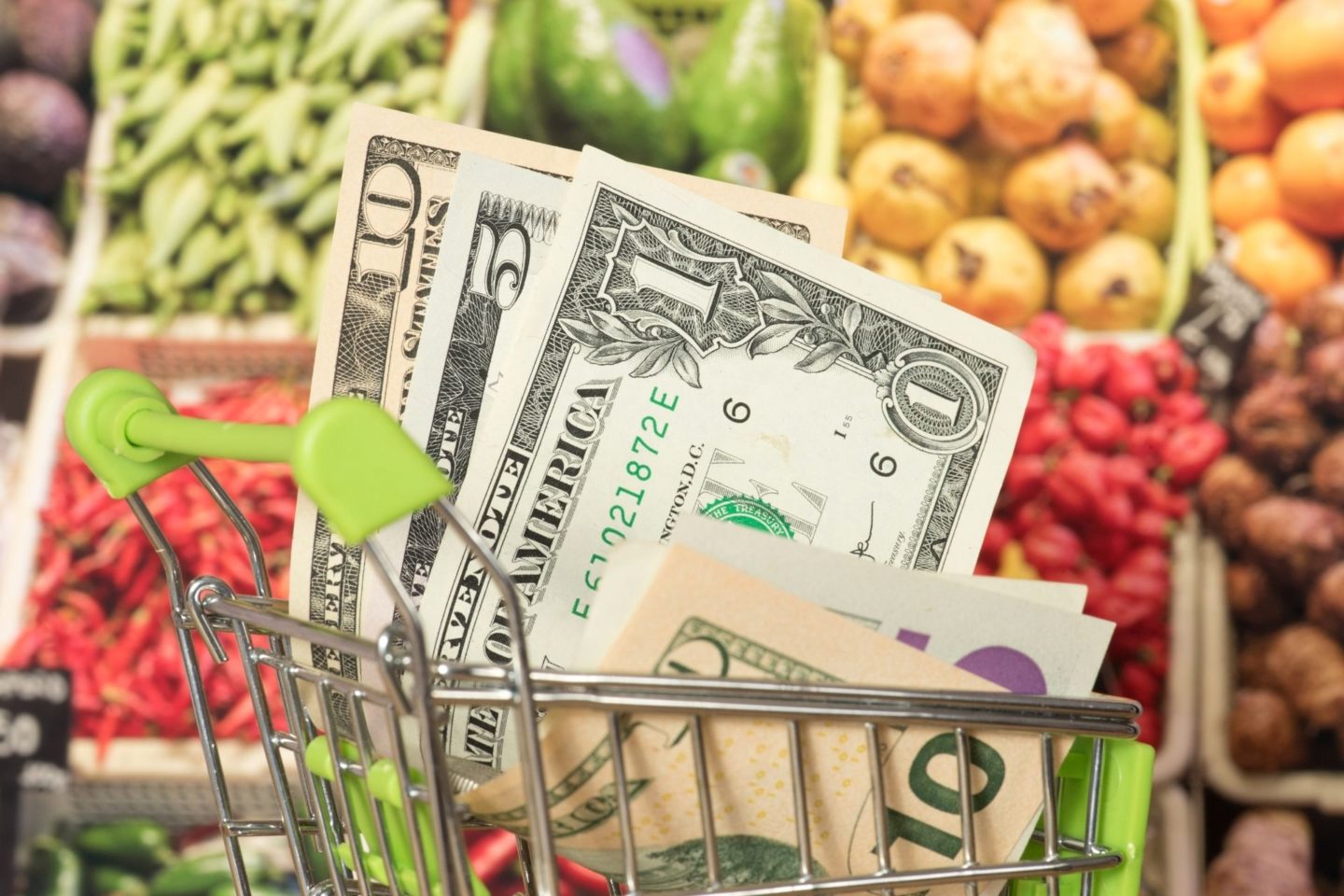
Are you too frustrated of blowing off your budget every time you go grocery shopping? Do you want to learn how to save money on groceries? If yes, then you are in the right place!
Groceries are something we cannot do without. I mean, you can, not buy bottled water for a year and still survive. But for obvious reasons, you need groceries every single day.
So, does that mean you need to eat less to save more money? NO, absolutely not!
When I started budgeting money, I failed. Every month, my expenses were way past my monthly budget, and it was so frustrating. So, I decided to find the culprit, and to my surprise, the grocery bills cost me almost double than I thought they should.
After a lot of thinking and planning, I was finally able to cut my grocery bill in half without sacrificing my love for food
Here is a compilation of the best tips to maximize your grocery budget and save money.
Simple ways of saving money on groceries
Save this on Pinterest to read it later
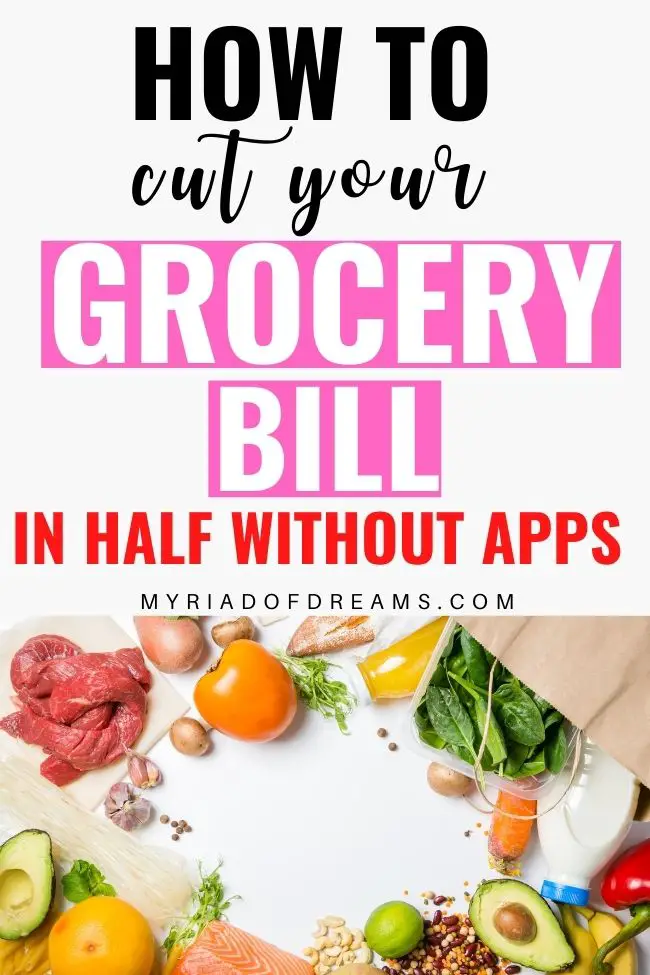
-
Have a grocery budget
It is super easy to go overboard when you don’t know where to stop. Therefore, it is essential to set aside a particular amount of money every month from your salary exclusively for groceries.
This way you will be able to track your money and cut your spending short when you are about to exhaust the limit.
Just don’t decide any random amount to be your grocery budget for the month. The best way to create a reasonable budget is by analyzing your past two months of grocery spending. For example- if you spend approximately $800 to $1000 on groceries every month, it would be illogical to set a monthly budget of $400. You won’t be able to stick to it and ultimately be frustrated for overspending. Therefore, to be a successful saver, it is very important to get the first step right.
-
Go shopping fewer times
Do you find yourself scouting the shelves of the grocery store every other day? Or do you grab your groceries every day on your way home from work? If your answer to any of the two questions is yes, then you need to stop!
The more you visit the store, the more you spend. It is that SIMPLE!
OK, so tell me! Have you ever walked out of a supermarket with just one carton of milk? Most probably, not! Before going to the dairy section, you pass through the fresh produce section, where you see all the colourful vegetables and fruits. And you think, oh you need to buy apples! After all, an apple a day keeps the doctor away.
Next, you see the freshly baked bread and you put in your basket. Come on, a cup of coffee with a sandwich would be so great! At the end when you finally stretch your hand to grab the carton of milk (btw, the sole reason of your visit), you see cheese and add it to your basket. Hey, a sandwich without cheese is boring!
At the checkout counter you have minimum 3 to 4 items extra, which you didn’t intend to buy but still bought, because you thought you need them. Instead of spending $1, you spent $10.
Unless you have some super-power or you have mastered self-control (which I believe is not the case), it is impossible to buy a single product. So, it is always a good idea to visit your grocery store weekly. Go grocery shopping no more than 5-6 times a month.
-
Make a list
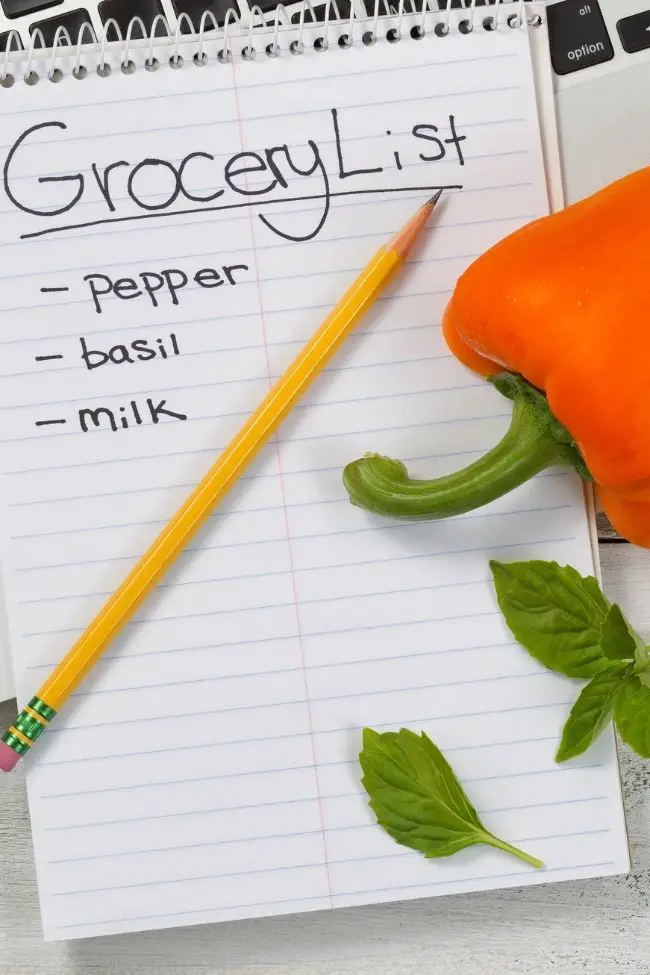
Now, as you have decided to visit the supermarket less frequently, how do you get all the stuff? What if you forget to buy something? The answer is simple! Make a list!
I stick post-it notes on my fridge, so that every time I see a jar or a carton empty, I write it down. Keep a pen in your kitchen so that you never forget to add stuff to your list. Before going for shopping click a picture of this note or simply take it with you.
Write each and everything you need to buy for the week and avoid using generic words. For example- don’t write vegetables, instead, be specific and write the names of vegetables you need to buy. This way you won’t end up buying unnecessary stuff.
And the most important thing is to stick to this list religiously. If a thing is not on the list, you don’t need it.
-
Visit the Farmer Market
Instead of going to your usual supermarket, visit a farmer market to buy fresh produce.
Firstly, the cost of the product is cheaper than that at the local grocery store. Secondly, unlike in grocery stores where the products lie on shelves for days, everything in the farmers market is fresh. The spinach won’t wilt and the bananas won’t rot the next day. Imagine the amount of food and money you will save every month, by not throwing unused food items.
And lastly, you will help the local farmers. It is important to encourage small businesses in your city. The million-dollar companies won’t go broke if you don’t buy their products, but the farmers would.
-
Eat before you leave
This sounds stupid, right? But this step is such a game-changer.
When you are hungry or for that matter not full, everything in the supermarket looks tasty. And who doesn’t like tasty food?
Without giving much thought you add items (that you don’t need) to your basket because you want to eat them. The packet of chips, the box of cookies and everything pre-made looks so tempting. This leads to overspending and also buying a lot of junk food.
Eating a light snack before a visit to the grocery store will not only improve your finances but your health too.
-
Use cash
Avoid paying the bill using your card, especially credit card.
If you want to spend within your budget, you have to see your money leave your wallet. If possible, assign a pocket of your wallet specifically to grocery money. This may sound weird, but this has helped me so much.
It is imperative to know where your money is going and how much more you are left with at a given time.
-
Compare the price
Before buying anything, compare the price of all the brands.
Generic products and store brands are often cheaper than the brands whose ads you see on television. The quality of generic and store brands is usually the same or sometimes even higher than that of fancy brands.
Another thing to do before making the final purchase is to bend down and look for products kept at the lowest shelf. The most expensive products are kept at eye level so that people can find them easily. Whereas the cheaper products are kept at places which are difficult to reach.
-
Avoid pre-cut fruits and vegetables

Although cutting and chopping is boring, but it only takes a few minutes.
Those pre-cut fruits and veggies are so much costlier than the whole produce. Think again, do you seriously need sliced melons? I mean, is all that added cost worth it? I don’t think so! For that much, you can actually buy the entire melon.
We are made to buy things in the name of convenience, but they are nothing more than marketing gimmicks.
Orange is such an easy fruit to eat. You can eat it without a knife, but still, I see people buying orange segments wrapped in plastic. To my surprise, I recently saw peeled banana topped with chocolate sauce in a supermarket near me, and its cost equal to 4 unpeeled bananas.
-
Buy toiletries at the drug store
Never buy toiletries and hygiene products such as pads and tampons at the supermarket. It is convenient but expensive. Buy them from your nearest drug store.
-
Shop clearance sale
Every supermarket has a clearance sale section. And as it is a sale, so naturally the things are cheaper than usual.
Some grocery stores keep the items on sale away from their original aisle, so the customer doesn’t buy the cheaper one. For example- discounted pasta won’t be placed next to the pasta sold at full price. They will keep it may be near the cereal section or the noodles. You need to find places where they sell discounted items.
The sale section is usually kept at the end of the supermarket so that by the time you reach there, you have already bought those items from their usual place. But now you buy the things on sale too, because they are so cheap. Thinking you can use them later or there is no harm in stocking them up.
This hurts your monthly budget. Therefore, it is best to start shopping from the clearance section of the store.
-
Learn to use leftovers
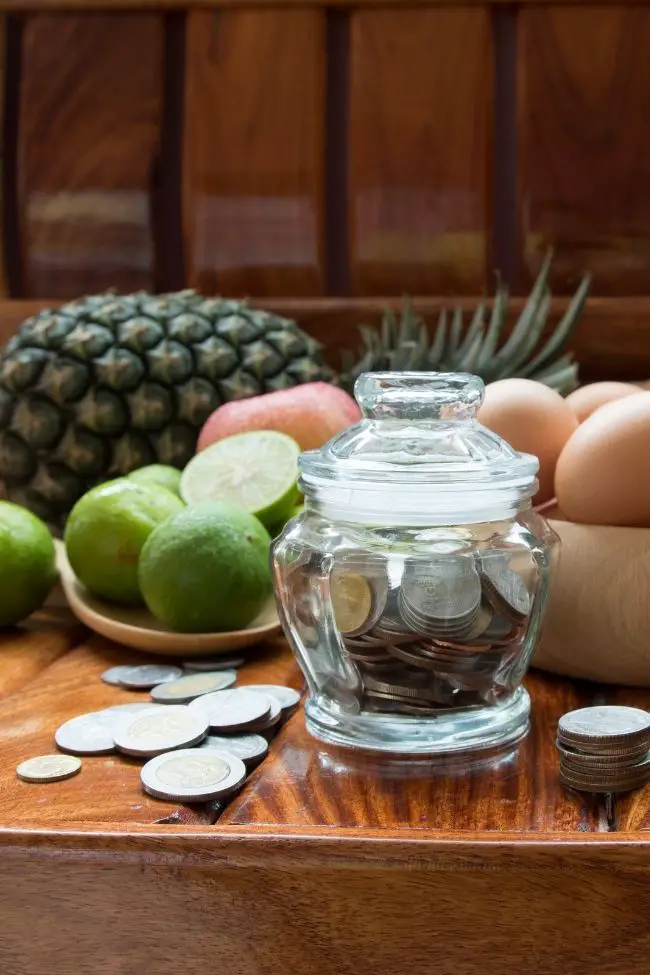
You can save so much money and food by using leftovers. You can eat your food, till it has not gone bad.
When you have cooked something way too much in quantity and it is impossible to finish within a couple of days, then freeze it. Take it out of the freezer, heat it and enjoy it on days when you don’t have the energy to cook. You won’t even have to order food from a restaurant. Again, you can save money!
Apart from leftovers, cheese, herbs and stock are some of my favourite items to freeze.
-
Shop alone
You have a list of items you need to buy, Right? And you know how important it is to stick to that list to control your grocery spending?
You just can’t stick to the list when you have company. Because two people are attracted to different things. There will be more of impulse buying and less of saving.
And if you are a mom, bringing kids to the grocery store is a bad idea. They will always blow your monthly budget by making you buy cookies and cereals (with cartoon figures on them), that they would later refuse to eat. Shop when they are at school or home with their dad or a babysitter.
-
Buy refills
Refills are cheaper than buying the entire bottle of something. For example – you can buy refills of hand soap, glass cleaners, salt, sugar and spices. This way you save money and also help save the environment by reusing the bottles and not creating unnecessary waste.
-
Buy in bulk
You can always buy nonperishables in bulk. The bigger the quantity, the cheaper it gets. I buy items such as pasta, flour and detergent in bulk. It is always cheaper.
Every household has different needs. No size fits all, hence, you must decide what you can buy in bulk, in order to save money.
I bake and eat a lot of bread and therefore buying flour in bulk saves me money. If you are a person who doesn’t eat a lot of bread, buying flour in bulk means wastage of money and food. Decide what you use a lot and buy that thing in bulk.
-
Use store credits
Many grocery stores have loyalty programs where the customer gets store credits for every purchase they make. Registration to such services is usually free of charge.
If you shop often at the same store, it won’t hurt to save a few bucks by getting store credits.
You may also enjoy:
Easy ways to save money during the holidays; 10 Money saving tips
100 simple ways to improve your health
How to stop caring about what others think : 8 simple ways
Pin for later
